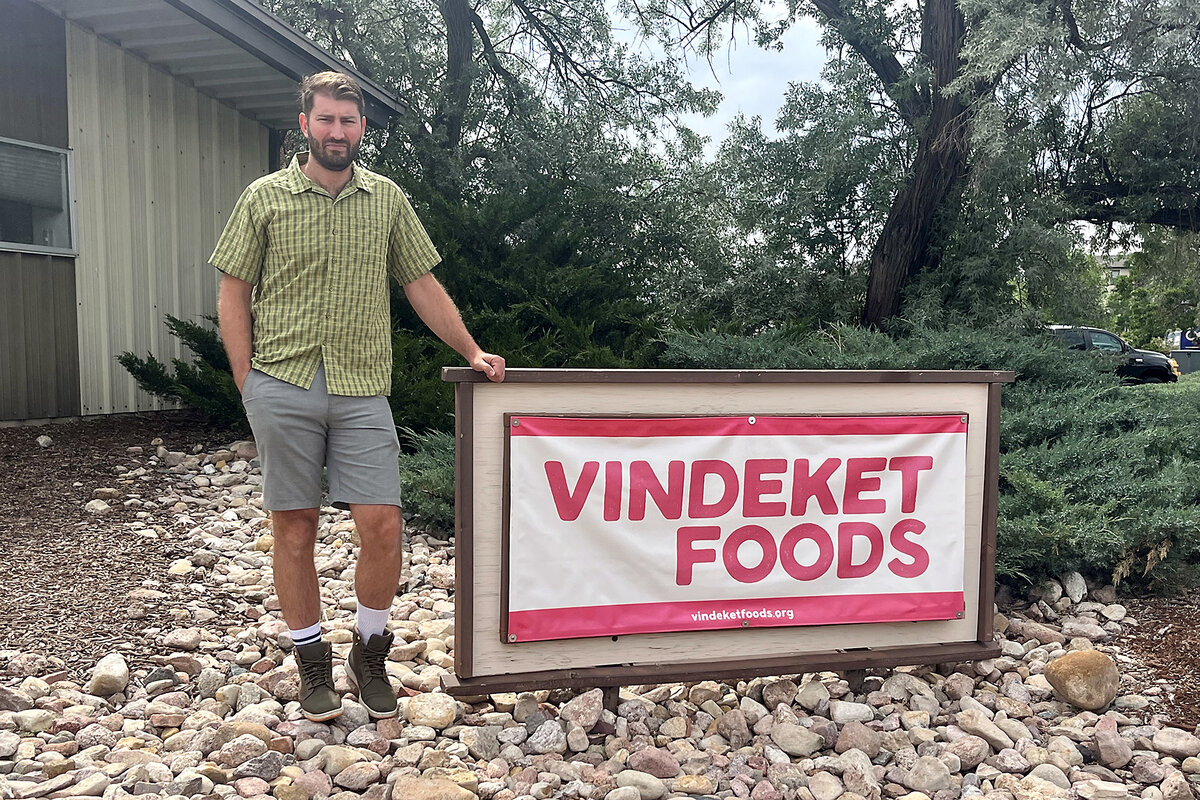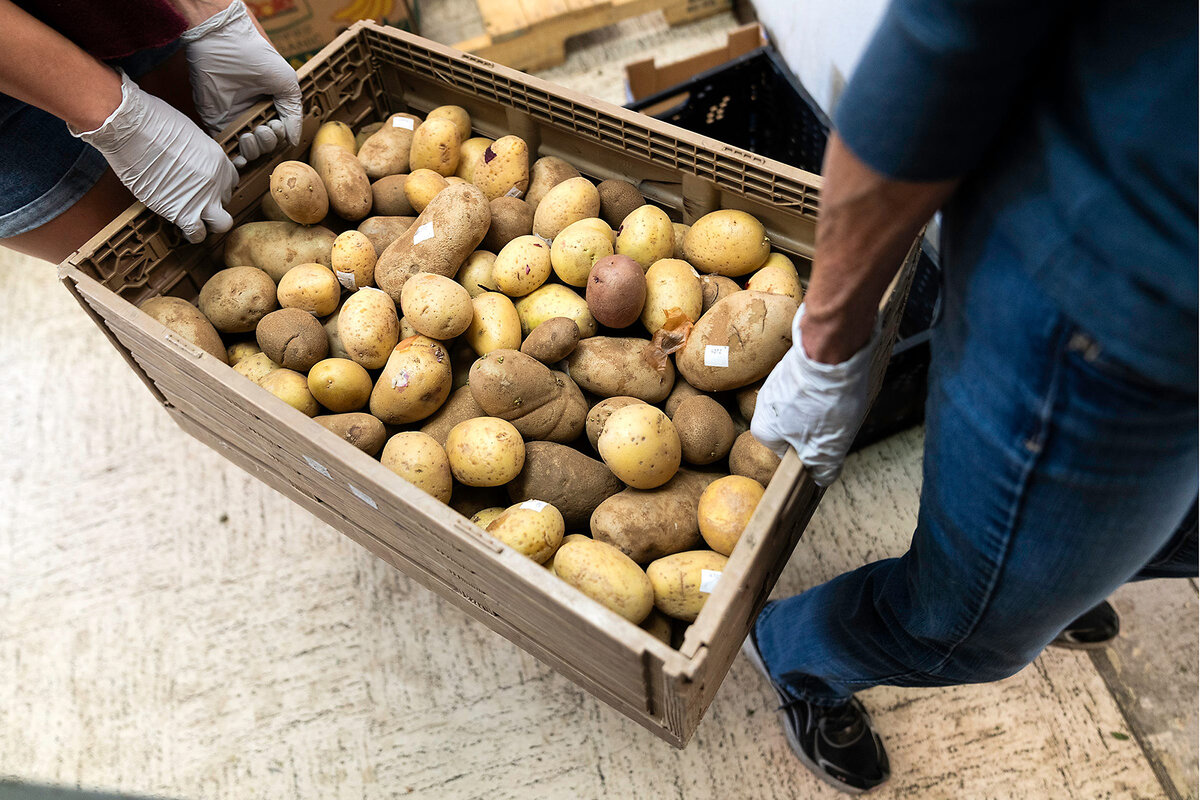Don’t toss that bruised banana. A Colorado market rescues food to serve the community.
| Fort Collins, Colo.
If it weren’t for Nathan Shaw, a lot of his community members’ dinners would be sitting in a landfill.
Instead, shoppers at Vindeket Foods, Mr. Shaw’s food rescue operation in Fort Collins, Colorado, are piling cardboard boxes full of bread, milk, and produce. Not all of the goods are perfect – here and there is a bruised apple, or a container of yogurt past its prime yet still safe to eat. The food is free, though some shoppers make monetary donations to help support the market.
Vindeket has grown from a garage grocery store in 2017 to a thriving nonprofit that, according to Mr. Shaw’s calculations, served 120,000 people last year. Unlike many food banks, Vindeket accepts only food and household supplies that otherwise would have been thrown out.
Why We Wrote This
A story focused onThe United States is the biggest food waster. The founder of Vindeket Foods finds a second life for items that stores, farms, and restaurants sometimes discard.
One room at Vindeket is filled with boxes of bananas. “Bananas have a very short shelf life because once they start to ripen, they go downhill very fast,” Mr. Shaw says, holding up a bunch that’s far from bright yellow. But even when the fruit is brown, as he explains to shoppers, it can be used in banana bread, or can be frozen and put into smoothies. “Ultimately,” he says, “our mission is to change how we as people look at food.”
Educating consumers
If global food waste were a country, it would be the third-largest contributor to global warming. Food waste contributes 8% of global greenhouse gas emissions, and the United States is the world’s biggest waster. The Environmental Protection Agency estimates that more food reaches landfills and incinerators daily than any other material.
Food waste also affects consumers’ pocketbooks. The average family of four in the U.S. spends $1,500 each year on food that is never eaten. Edward Spang, an associate professor of food science at the University of California, Davis, points out that this waste is occurring even as food costs rise across the country.
“I don’t think people think about the dollar value,” he says.
Vindeket’s efforts are part of a broader trend. According to the EPA, there are growing efforts across the country to prevent food waste. The agency has an interactive map currently showing nearly 950,000 sources of excess food, including correctional and health care facilities, and about 6,500 potential recipients of that food, including food banks.
Officials and some businesses are also taking steps to address food waste. In June, the White House unveiled a national strategy to cut U.S. food waste in half by 2030. More than 45 businesses and organizations had already committed to that goal within their operations by 2022, including large companies such as Amazon and Starbucks.
Vindeket appeals to shoppers who are making their own individual efforts to address waste. Josanne Lucas, a high school teacher in Fort Collins, says that in the Caribbean community where she was raised, people were always careful to use everything they had. She has shopped at Vindeket for five years and usually takes home produce – “any unusual, atypical foods that I normally wouldn’t purchase,” she says. One of her favorite finds was callaloo, a leafy green vegetable (sometimes called Caribbean spinach) that’s rarely stocked in U.S. stores.
“Growing up, I would always have either neighbors or family members give us any excess fruits or vegetables that they have, and then we also did the same,” Ms. Lucas says. “I like that aspect of Vindeket.”
Before he was the executive director of Vindeket, Mr. Shaw says, he and some of his friends were “big dumpster divers” out of curiosity. While going through garbage looking for usable food, Mr. Shaw was shocked by how much high-quality food was going to waste. “Some of the nicest things” had been tossed out, he says.
The food at Vindeket needs saving for a variety of reasons. Grocery stores sometimes throw out products that are past their “best by” date stamp, even though they are still safe to eat. Food could have been overstocked or damaged, or was simply not visually appealing.
That’s why, in addition to providing a no-cost market for the community, Mr. Shaw and his staff strive to educate people about food waste through social media, online videos, and community events and classes. He hopes that if people change their standards for what they find acceptable in food, it will prompt stores to keep food on their shelves longer.
Dr. Spang affirms that education is a valuable tool in reducing food waste.
“A lot of consumers don’t know that those date labels are not representative of the moment some food is bad for you,” he says. “It’s just the producer’s best guess of how long they can guarantee quality.”
Community buy-in
Vindeket’s food is donated by grocery stores, restaurants, and farms, which are able to receive tax deductions on the gifts. Some donors are regulars; others are spontaneous.
“It’s so varied, because we’ll have someone hit us up out of nowhere,” Mr. Shaw says. “We’ll hear of a truck on [Interstate 25] that maybe got denied at some distribution center because some of the peppers had a weird speck on them, or maybe the temperature was a little off on some broccoli, or whatever it is. And so they’ll call us.”
Alex Zeidner is one of Vindeket’s regular donors. He owns the nearby Folks Farm & Seed, which he started in 2019 on the land on which he grew up. Folks Farm & Seed has collaborated with Vindeket for about four years and makes a donation most weekends. “I just love to see the stuff get used one way or another,” Mr. Zeidner says. He used to be a Vindeket customer and says the kindness of the staff members he interacted with was his favorite part of shopping there.
“I see the work that they’ve done and how they’ve grown as very inspiring,” he says. “They keep showing up.”
The name Vindeket meshes the words “advocate” and “vindication,” Mr. Shaw says. He sees vindication in this case as righting a wrong, by extending the life of food. “We are advocates of the vindication,” he explains, smiling.
Mr. Shaw points out that about a year ago, an older shopper approached him. “I don’t feel broken when I come here,” the shopper told him.
Vindeket is giving food and, in some cases, people a second chance.








